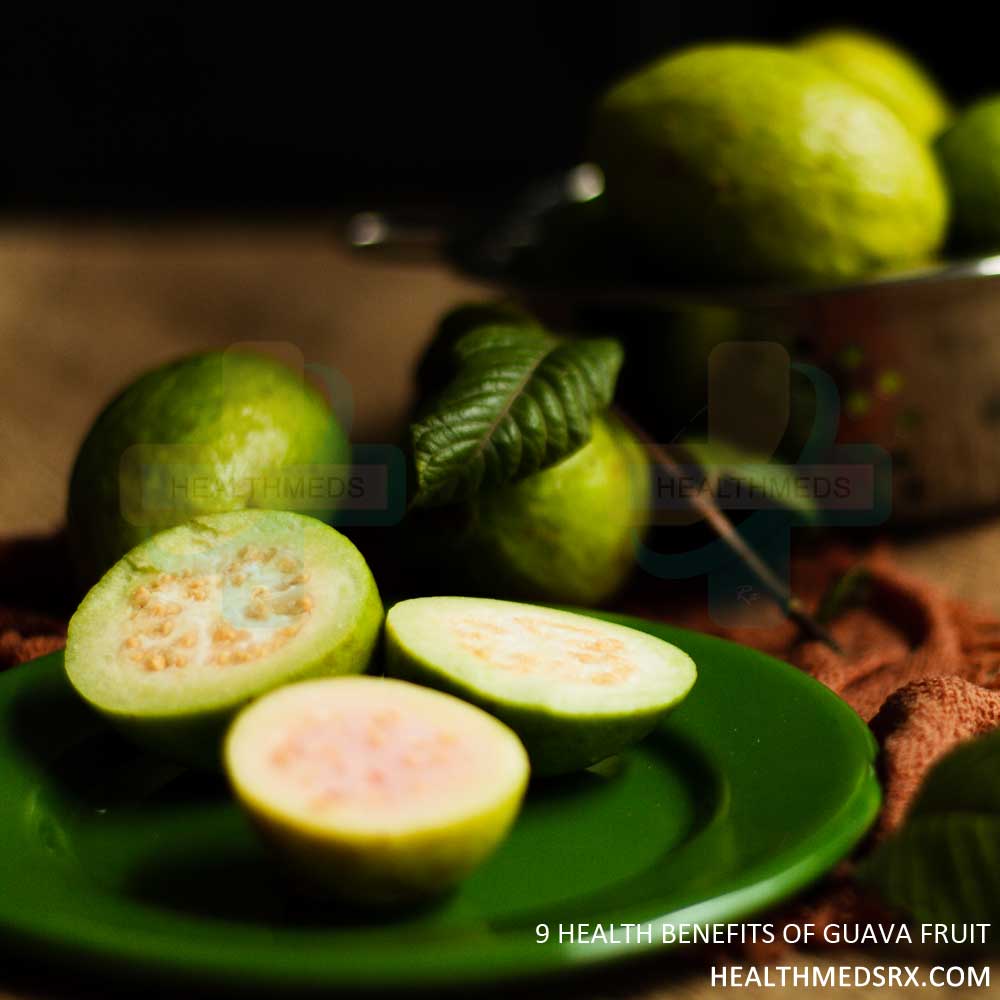9 Health Benefits of Guava Fruit

Guava fruit is a delicious addition to any diet as they contain many health benefits. First of all, guava is rich in vitamin C, which strengthens your immune system and helps prevent common diseases. Also, it has a high fiber content that promotes a healthy digestive system and helps prevent constipation. It contains antioxidants that reduce the risk of chronic diseases such as cancer and heart disease. The fruit can also help maintain blood sugar levels as their low glycemic index makes them a good choice for people with diabetes. Finally, the nutrients found in guava fruit support good skin, hair, and general health. It can be a tasty and nutrient-dense addition to your diet.
Guava also contains carotenoids such as beta-carotene, lycopene, and lutein/zeaxanthin. These carotenoids give it its pink color and act as antioxidants. Antioxidants help protect the body from oxidative stress and inflammation.
Nutritional Value of Guava
Guava is a tropical fruit that not only offers a delightful taste but also provides several important nutrients. Here are some nutritional facts:
Vitamins- It is rich in vitamin C, with a single piece containing more than double the daily recommended intake. Vitamin C is crucial in supporting the immune system, promoting collagen production, and protecting against oxidative stress.
Fiber- Guavas are an excellent source of fiber, with one fruit containing about 9% of your recommended daily intake. The seeds also contain soluble and insoluble fiber.
Antioxidants- It is full of antioxidants like lycopene that help protect your body against free radical damage.
One particular antioxidant that is present in abundance in this fruit is lycopene. This is the same antioxidant found in tomatoes that gives them their bright red color. Lycopene has been linked to many health benefits, including:
- Reducing inflammation
- Lowering the risk of prostate cancer in men
- Improving sperm quality
- Protecting skin from UV ray damage
Minerals- It contains several essential minerals including Potassium, Magnesium, and Copper.
Common Types
There are several different types, each with its unique characteristics. Some common cultivars include:
- White: This type has white meat and greenish-yellow skin. It is renowned for having a sweet, somewhat tropical taste.
- Pink: The greenish exterior and pinkish-orange meat of the pink guava are immediately distinguishable features. It tastes sweet and tart, and juice-making frequently uses it.
- Red: Pink meat and lovely scarlet skin characterize red guavas. Generally speaking, they are sweeter than other kinds.
- Yellow: It is known for its slightly sweet and tropical flavor. Yellow guava is often enjoyed fresh or used in various culinary preparations, such as juices, smoothies, jams, and desserts.
Health Benefits of Guava
- Heart Health- The high levels of dietary fiber, potassium, and antioxidants found in it make it a heart-healthy food choice. These nutrients encourage a healthy heart since they can lower blood pressure, lower bad cholesterol, and shield the body from oxidative stress.
- Boosts Immunity- High vitamin C content makes it a great food for strengthening immunity. A single guava provides more than 200% of the daily required amount of vitamin C. It is a superfood for boosting the immune system and fending off colds, the flu, and other ailments because of its high vitamin C content and other health-promoting ingredients. Regularly consuming guavas or guava juice helps strengthen your immune system.
- Improve digestion- It’s well known that it can help with digestion. Because of its high dietary fiber content, it helps to reduce constipation and encourage regular bowel movements. Furthermore, guava’s natural enzymes facilitate better food breakdown and nutrient absorption in the digestive tract, which improves digestion overall.
- Brain Function- Potassium and other minerals are abundant in it, as are B vitamins such as vitamin B3 (niacin), vitamin B6 (pyridoxine), and folate. These nutrients fuel the brain and aid in blood circulation, which enhances brain function.
- Cancer Prevention- Antioxidants, which can counteract free radicals in the body that harm cells and cause illnesses like cancer, are abundant in guavas. Lycopene and vitamin C, two strong antioxidants present in it, have been demonstrated to help lower the incidence of prostate cancer.
- Overall, it appears that antioxidants present prevent the development of cancer by shielding cells from the harm that reactive oxygen species (ROS) can cause. Because of this, guava fruit might be a useful supplement to a diet that fights cancer.
- Eyesight- These are rich in nutrients that promote good vision. It has been shown that lutein, a potent antioxidant present in large amounts in the fruit, can avert the onset of cataracts and macular degeneration. Lutein aids in shielding the eyes from UV ray damage. Lutein is found in the retina by nature, and eating guava helps raise the amount of this nutrient in the eye. High-energy blue light wavelengths that over time may harm the retina are filtered out by lutein. A high lutein diet lowers the chance of cataract development.
- During Pregnancy– Consuming it during pregnancy benefits women a lot as it contains essential nutrients like folic acid or vitamin B-9 which is beneficial for both the mother and the developing baby. It also helps to protect the new-born from neurological disorders.
- Blood Sugar Regulation- Consuming it is extremely beneficial for those with diabetes as guava is high in fiber which helps in controlling blood sugar levels.
- Aids Weight Loss- It can be incorporated into a diet to help lose weight for several reasons. To begin with, guavas are low in fat and calories. With 60–70 calories per medium-sized guava, it’s a filling and healthy snack choice. Guava also has a high dietary fiber content, which can aid in reducing hunger and promoting feelings of satiety. Additionally, the fiber level can help avoid constipation and maintain a healthy digestive tract.

